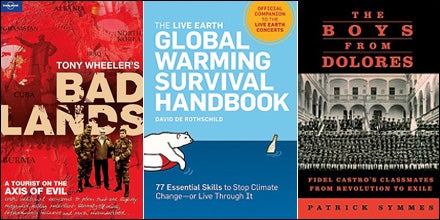IN 1972, AFTER EARNING an M.B.A. at the London Business School and spending a year backpacking in Europe, Asia, and Australia, Tony Wheeler and his wife, Maureen, founded Lonely Planet Publications, producing straight-dope guides to the world’s most exotic, often unwelcoming, spots. That same year, former Grand Canyon river guide Richard Bangs started Sobek Expeditions, the first outfitter to lead clients down some of the world’s hairiest rivers, from Ethiopia to India. More than three decades later, these pioneers of adventure travel may have mellowed a bit, but each remains brilliant at sniffing out action-filled journeys and packaging them with mostly fresh themes.
Bangs has turned his trips into tales in 16 books, all while helping launch the travel sites Mungo Park and Expedia. Now the king of first descents (the Zambezi, the Omo, the Tatshenshini, the Yangtze, and others) is back with , a chronicle of recent journeys that mix thrills with environmental and cultural causes. Some are still cranked with adrenaline, as when Bangs becomes the first to raft the raging North Johnstone River, in Australia (“insane, liquid chaos ┬ů I’m seized with a feeling of horripilation”). But most are fueled by more cerebral urges┬Śas when he explains black rhino conservation while tromping through Zambia. In Libya, Bangs sees Muammar Qaddafi’s new embrace of tourism as a personal challenge. Hoping to guide the first American tour there after a travel ban was lifted in 2004, he ends up hiking the Sahara in summer. “My head feels both too big and too brittle, as though it might crack open like an egg in boiling water.” It wasn’t his best idea, but Bangs, as always, endures.
Wheeler goes to Libya, too┬Śas well as Cuba, Iran, Myanmar, Albania, and Afghanistan┬Śin , a travelogue with a more political conceit: to venture to the dark side as a tourist of the so-called Axis of Evil. On a guided trip through North Korea, Wheeler admires (but can’t buy or photograph) the ubiquitous lapel buttons with images of the late Great Leader Kim Il Sung, whom he calls “the Dapper Despot.” In Iraq in 2006, he contemplates Paleolithic artifacts in one of the few museums to survive the post-invasion chaos. Not surprisingly, Wheeler finds mostly friendly people who are nowhere near as roguish as their political leaders. After knocking back 75-cent Heinekens in a run-down North Korean hotel, he plays musical chairs with his tour guide and the barkeep. “Clearly neither of them has experienced this Western children’s game before and [they] find it invigorating.” Wheeler jokes that he’s “unhealthily addicted” to travel. But getting off the beaten path proves once again his tonic.
BY OUR CONTRIBUTORS
Many who remember Fidel Castro from their 1940s days at the Colegio de Dolores┬Śan elite, Jesuit-run boys’ school in eastern Cuba┬Śstill refuse to say his name out loud. But when contributing editor Patrick Symmes tracked down a dozen of Castro’s old schoolmates, they shared stories about who he was then┬Śsmart, competitive, and less than well groomed, with the nickname Bola de Churde (that’s “Ball of Filth”)┬Śand how his radical politics ended up changing their lives. In , Symmes uses “Los Dolorinos” to create a picture of life just before and after the revolution. Meanwhile, contributor Ted Kerasote ditches leashes and stupid pet tricks for respectful companionship in , a chronicle of life in Wyoming with his Lab mix, Merle, who jumped in his raft one day and never got out. And explorer David de Rothschild is out to change human behavior with , a guide to things we can do about climate change┬Śfrom giving up meat (18 percent of greenhouse-gas emissions are produced by the livestock industry) to “adopting a glacier.”
┬ŚDIANNA DELLING


